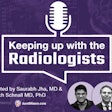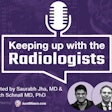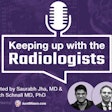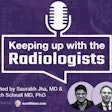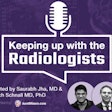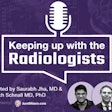AuntMinnie.com · The medical art of making a diagnosis vs certainty: Episode 4 Keeping Up With The Radiologists
As a medical educator, practicing academic internal medicine physician, and hobbyist medical historian, Adam Rodman, MD, owns a mental template of medical history that he brings into the contemporary context.
With this point to ponder, welcome to a new episode of "Keeping Up With the Radiologists," the podcast series brought to you by AuntMinnie.com in collaboration with Penn Radiology. Saurabh (Harry) Jha, MD, hosts this episode, the fourth in the ongoing series.
To start, Jha takes a broad swing at Rodman's drive in medical history. "We both deeply wonder why," Jha begins. Why do individual radiologists, or internists, all doctors for that matter, think the way they think in the process of making diagnostic decisions?
"Well," Rodman begins, "We only do things the way we do if we can do a study to show that in a randomized controlled trial .... I've always found that to be a necessary but not sufficient explanation for the beauties and horrors of human practice and custom.
"In fact, if you look at historical contingencies, a lot of things make a lot more sense than if you take a sort of positive, reductionist idea to why things are the way they are. Was that too much?" Rodman asks. You can decide after listening to the episode, in which you might catch the reference to Body Snatchers or The Knife Man but probably not long enough to wonder why.
What is the value of thinking in terms of common sense or biological possibilities? We know from modern-day investments that there's an extraordinarily high value, like billions, for thinking of biological possibilities. But the value of common sense is less talked about.
Jha continues, "The history of medicine says something about the way we think," and he probes into the historical context of making diagnoses. Rodman's research focuses on 19th- and 20th-century aspects, comparing and contrasting with the 21st century.
For example, "In the modern world, we have a tendency of medicalizing, to take things that previous generations would have considered normal and make them into a disease process," Rodman explained. "And how diseases change over time?
"Psychiatric diseases are fascinating because ... fundamentally, psychiatric diseases are based on the symptoms in the lived experience of a patient, which is what medicine used to be but is no longer," Rodman continued.
Diagnosis is an imperfect process, Jha begins. As in previous podcast fashion, he reflects on his vast medical experience. One reflection he shared is recalling a situation with a society that seeks to improve diagnoses. How they learned to check off the checklist and about anchoring bias, for example. If diagnoses are all about certainty, where are we now?
This episode will get you thinking. Large language models and machine-learning algorithms?
"A lot of people in the clinical reasoning space have moved away from this idea of diagnostic reasoning and more to the idea of management reasoning," Rodman begins. "At what level of certainty are we?" he asked. "I have no idea how AI is going to help with that." And there's much more down the path of diagnoses and diagnostic errors in this episode worth having a cup of coffee with colleagues over.
What about root cause analysis?
Are all medical errors solvable?
Should we accept the detection tradeoff?
"Diagnosis is one of those things that has changed a lot in 150 years and continues to change ... dramatically now that we're in the 21st century," Rodman said. "The more immediately life-threatening the lower your tolerance for error is. If it's something like acute intermittent porphyria, you can have a lower tolerance for error. You have time."
Let's say you have an inexperienced physician ...
How we approach the patient ...
How we extract data and put it into something meaningful to make a decision ...
"Suddenly, we have trainees offloading some of the cognitive processes to an artificial intelligence," Jha explains, leading Rodman to ask, "What does it mean to have medical education?" and say, "That's what really worries me." Attitudes might be changing for the value of "knowing" in medicine, something akin to the value of knowing your capitals, they discussed.
Taking what the machine says as gospel in medicine, the unpleasant cognitive work of writing progress notes, differentials, and more will be worth listening for in this episode of "Keeping Up With the Radiologists." Listen now.
More impressions from this episode:
{01:53:13} Epistemological extremists
{03:09:07} The Knife Man
{03:59:11} History of medicine
{09:17:07} Society for Medical Decision Making
{11:50:14} Diagnostic reasoning
{13:51:12} Detection tradeoffs
{22:16:18} Value of knowing in medicine
{25:43:10} AI for writing progress notes
{35:43:09} Decision support
{39:12:04} Emergency medicine
{44:00:16} Care crisis
{45:15:19} More categories of diseases
{50:12:11} Uncertainty the unconquerable beast
{50:38:01} Reducing diagnostic errors
{53:32:21} Wish list for labs and radiology
Special guest:
Adam Rodman, MD, is a medical historian and instructor in medicine at Beth Israel Deaconess Medical Center (BIDMC) in Boston. A general internist and hospitalist, Rodman completed his medical and public health degrees at Tulane University School of Medicine in New Orleans and completed an internship and residency in internal medicine at Oregon Health and Science University in Portland, OR, as well as a fellowship in global health at BIDMC while practicing in Molepolole, Botswana. Rodman hosts the medical history podcast "Bedside Rounds," made in partnership with the American College of Physicians. Rodman's first book, "Short Cuts: Medicine," was released in 2023.
Featured:
Saurabh (Harry) Jha, MD, is an associate professor of radiology at the Hospital of the University of Pennsylvania. Jha obtained a master’s degree in health policy research from the Leonard Davis Institute at the University of Pennsylvania. He earned his medical degree from the United Medical and Dental Schools of Guy’s, King’s, and St. Thomas’ Hospitals. Jha developed Value of Imaging, a set of radiology educational resources.











